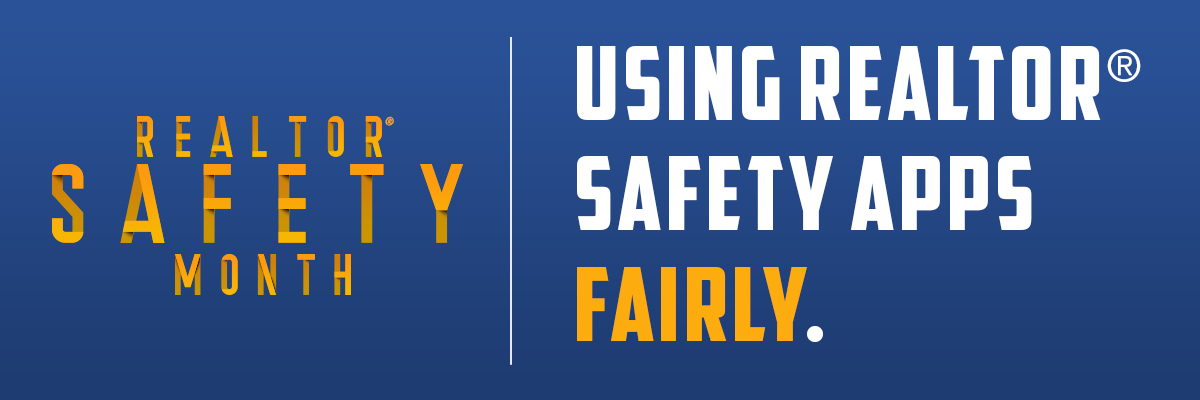Safety Apps and Fair Housing: Make Sure You Stay Compliant
September 1, 2022

Many REALTORS® have been exploring or using safety apps before meeting potential clients. This can be a good practice, but there are a few laws that can come into play and land you unintentionally in hot water. Safety is a paramount concern for our members, but make sure when you are using these apps you are abiding by the Virginia Fair Housing Act.
As a reminder, the Virginia Fair Housing Act is the policy of the Commonwealth of Virginia to provide for fair housing throughout the commonwealth, to all its citizens, regardless of race, color, religion, national origin, sex, elderliness, familial status, source of funds, sexual orientation, gender identity, military status, or disability.
If you are using one of these safety apps or web services, our biggest suggestion is that you use them uniformly on everyone due to potential risks. We have come up with some potential risks that you may run into when using these apps or services.
Client Name
One way you may violate fair housing when utilizing an app could be on the basis of race, color, or national origin. As a REALTOR®, you receive many calls from prospective clients, perhaps whom you have not met in person yet. You then decide to do some due diligence on the prospective client and run their phone number in one of the apps or web services. The easiest way to run afoul here would be not wanting to meet with certain clients because of their name. If you are meeting with some and not others, merely because of their name, it could be argued that you are creating a disparate practice which could be used against you.
Client Address
Another potential Fair Housing violation would be using the address that pops up in their record as a reason not to meet with them. If you use their address as a potential exclusionary factor and their address is tied to an area where a predominant protected class resides, then you could be violating Fair Housing. Additionally, you might see their address and think that they could not afford any of your listings, or even use their current address to inform what other types of houses you show them. This could also land you in trouble with Fair Housing.
Additional Examples
What are some other ways you may get in trouble? You only use the app on clients that you know are using FHA loans, you are only using them for clients with disabilities, or you are only using them on clients of a certain religion. These could very likely expose you to a Fair Housing violation. You can also run into trouble using an app to run transaction checks on a potential client. The Fair Credit Reporting Act does contain a carve out which would allow you to do so merely because you are checking transactions and not for example, obtaining a credit worthiness. A potential way you could run into trouble is by using this information and combining it with, for example, source of funds. However, if you are legitimately concerned about the transaction being a scam then you should act accordingly.
We want our members to stay safe at all times. We also do not want you to run into any legal issues while trying to remain safe. So, it is imperative that if you use any of these apps or web services, you apply them with a standard and apply them consistently. For a full discussion with our legal team about this topic, please check out this episode on our Caveat Legal Podcast.
Legal Disclaimer: Although the information in this blog is from attorneys, the legal information is not a substitute for personalized legal advice from an attorney licensed to practice in your jurisdiction. The information provided by Virginia REALTORS® is general reference work as a public service and does not constitute solicitation or provision of legal advice. We provide this general legal information on an ‘as-is’ basis. We make no warranties and disclaim liability for damages resulting from its use. Legal advice must be tailored to the specific circumstances of each case, and laws are constantly changing. The information provided should not be used as a substitute for the advice of competent counsel.
You might also like…
“Can cooperative compensation be a condition of the buyer-broker agreement?”
By Ryan Leonard - July 24, 2024
*Please note: Any questions regarding Legal Hotline Spotlights should be submitted via the Virginia REALTORS® Legal Hotline. Our attorneys are unable to respond to questions through our comments section. Q:… Read More
Your Guide to Tenant Confidentiality According to the VRLTA
By Jon Haley - July 17, 2024
Keeping information received from tenants and prospective tenants confidential is one of your most important responsibilities as a property manager. Luckily, the VRLTA provides a pretty thorough list… Read More
“A home I’m listing borders land where a mixed-use development is planned. As a dual agent, must I disclose this?”
By Sean Olk - July 15, 2024
*Please note: Any questions regarding Legal Hotline Spotlights should be submitted via the Virginia REALTORS® Legal Hotline. Our attorneys are unable to respond to questions through our comments section.… Read More